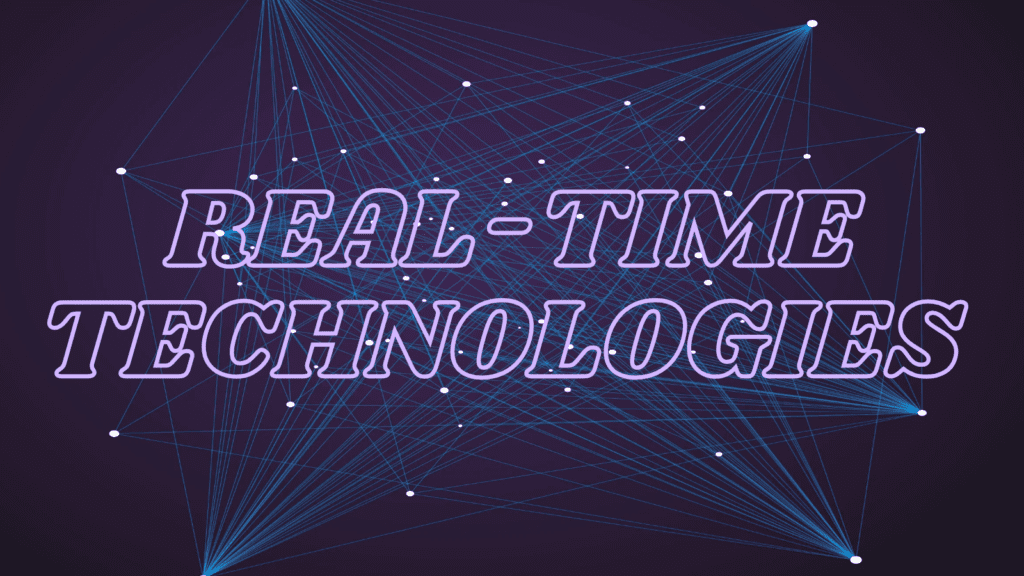The Evolution of Real-Time Technologies: Powering a Connected World

In today’s rapidly evolving technological landscape, real-time technologies have emerged as a driving force behind the seamless integration and connectivity that define modern life. From instant messaging and live streaming to real-time data analytics and smart cities, the applications of real-time technologies are vast and transformative. This blog post explores the evolution of real-time technologies, their significance across various sectors, and the potential they hold for shaping the future.
The Emergence of Real-Time Technologies
Real-time technologies have their roots in the early days of computing, where the concept of processing data instantly gained prominence. The transition from batch processing to real-time systems was driven by the need to make decisions and respond to events in the fastest possible manner. The introduction of technologies like Real-Time Operating Systems (RTOS) marked a turning point, enabling systems to react within milliseconds or microseconds.
Applications Across Industries
Communication and Social Media: One of the most significant impacts of real-time technologies has been on communication. Instant messaging platforms and social media networks have revolutionized the way people connect, allowing them to share information and experiences in real time across the globe. This level of connectivity has reshaped social interactions and even influenced political and social movements.
Finance and Trading: Real-time technologies have transformed the financial sector, enabling high-frequency trading and real-time stock market analysis. Traders can make split-second decisions based on up-to-the-second data, resulting in unprecedented market efficiency and volatility.
Healthcare and Medicine: In healthcare, real-time technologies are saving lives through remote patient monitoring, wearable health devices, and telemedicine. These technologies provide healthcare professionals with real-time data, allowing for early intervention and personalized patient care.
Transportation and Smart Cities: Real-time technologies play a pivotal role in modern transportation systems and smart cities. Real-time traffic data, public transportation tracking, and predictive maintenance for vehicles all contribute to more efficient and sustainable urban living.
Overcoming Challenges Through Innovation
As the demand for real-time technologies continues to grow, innovative solutions are emerging to address the challenges that come with their implementation. Companies and researchers are focusing on developing more robust data validation and verification processes to ensure the accuracy of real-time data. Machine learning algorithms are being employed to detect anomalies and outliers, enhancing the reliability of real-time analytics.
Furthermore, the advancement of blockchain technology is also playing a role in enhancing the security and integrity of real-time systems. Blockchain’s decentralized and tamper-proof nature can provide a trusted framework for verifying real-time data, especially in applications where data authenticity is critical, such as supply chain tracking and financial transactions.
Real-Time Technologies and the Edge Computing Revolution
The evolution of real-time technologies is closely intertwined with the rise of edge computing. Edge computing involves processing data closer to its source, reducing latency and enabling quicker response times. This is especially crucial for applications that demand immediate actions, like autonomous vehicles and industrial automation.
Edge computing complements real-time technologies by decentralizing data processing, enabling devices to make decisions locally without relying solely on a centralized data center. This approach not only improves responsiveness but also reduces the load on network infrastructure, contributing to more efficient and resilient systems.
Ethical and Societal Implications
While real-time technologies offer immense benefits, they also raise ethical and societal considerations. The real-time nature of data transmission can potentially lead to the spread of misinformation and the rapid dissemination of harmful content. Striking a balance between free expression and responsible content sharing becomes crucial to mitigate these challenges.
Additionally, issues related to privacy and surveillance require careful attention. As real-time technologies become more integrated into daily life, questions arise about who has access to the real-time data generated by individuals and devices. Robust data protection regulations and ethical guidelines must be in place to safeguard user rights and maintain trust in these technologies.
Collaboration and Interdisciplinary Efforts
The evolution of real-time technologies calls for collaboration across various disciplines. Engineers, data scientists, ethicists, policymakers, and other experts need to work together to address the technical, ethical, and regulatory aspects of these technologies. Multidisciplinary approaches can ensure that real-time technologies continue to evolve in a responsible and beneficial manner.
Empowering Individuals and Enhancing Quality of Life
In the ongoing evolution of real-time technologies, a central theme emerges: empowering individuals and enhancing their quality of life. The seamless access to real-time information has already revolutionized how we make decisions, stay informed, and interact with our surroundings. As we look ahead, the potential for even greater positive impact becomes evident.
Real-time technologies are transforming education, enabling remote learning with interactive experiences that bridge geographical gaps. Students can participate in live virtual classrooms, engage in real-time discussions with peers and educators, and access a wealth of resources instantaneously. This democratization of education has the power to shape a more educated and informed global population.
Healthcare is another domain where real-time technologies are proving to be invaluable. Wearable devices can monitor vital signs in real time, alerting individuals and healthcare professionals to potential health issues before they escalate. Patients with chronic conditions can receive timely interventions, improving their well-being and reducing the burden on healthcare systems.
Sustainability and Real-Time Insights
The fusion of real-time technologies with data analytics is driving sustainability efforts across industries. Smart cities, for example, leverage real-time data to optimize energy consumption, reduce traffic congestion, and minimize waste. Real-time insights enable swift adjustments to resource allocation, fostering more environmentally conscious practices.
Similarly, industries such as agriculture benefit from real-time data collected by sensors in the field. Farmers can make informed decisions about irrigation, pest management, and crop yield optimization based on up-to-the-minute data. This leads to improved resource utilization and higher agricultural productivity, contributing to global food security.
The Human-Centric Approach
Amidst the technological advancements, it’s important to maintain a human-centric approach. As real-time technologies become more integral to our lives, user experiences must remain intuitive and user-friendly. User interface design and human-computer interaction will play a pivotal role in ensuring that the benefits of real-time technologies are accessible to individuals of all backgrounds and levels of technical expertise.
Moreover, the integration of real-time technologies should prioritize inclusivity. As we develop solutions that rely on real-time data, it’s crucial to consider accessibility for individuals with disabilities, ensuring that everyone can fully participate in the benefits these technologies offer.
Conclusion
The evolution of real-time technologies has ushered in a new era of connectivity, efficiency, and empowerment. From their humble beginnings in early computing to their current role in shaping various industries, real-time technologies have demonstrated their potential to revolutionize the way we communicate, trade, heal, and live in smart cities. As these technologies continue to advance, collaborations across disciplines will be essential to navigate ethical and societal challenges. With a focus on human-centric design and inclusivity, real-time technologies have the power to create a more informed, sustainable, and connected world for everyone.
Don’t miss out on updates! Subscribe now to stay informed and empowered!

